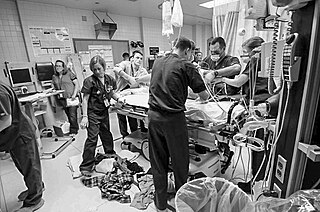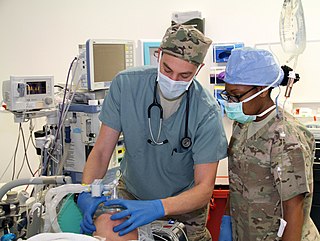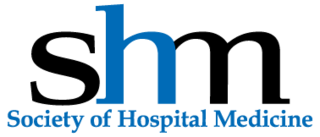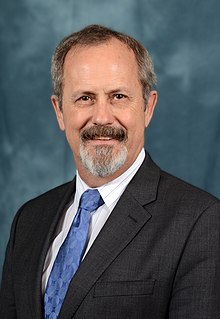Professional certification, trade certification, or professional designation, often called simply certification or qualification, is a designation earned by a person to assure qualification to perform a job or task. Not all certifications that use post-nominal letters are an acknowledgement of educational achievement, or an agency appointed to safeguard the public interest.
Medical psychology is the application of psychological principles to the practice of medicine, and is clearly comprehensive rather than primarily drug-oriented, for both physical and mental disorders. The specialty of Medical Psychology and the National Alliance of Professional Psychology Providers (www.nappp.org) has been instrumental in advocacy and professional publications in increasing the awareness of Governmental Agencies, Scientific Societies, and the World Health Associations about the limited effect of "medication only approaches" to mental disorders and many related chronic physical disorders. A Medical Psychologist is a specialist who holds board certification in Medical Psychology from the American Board of Medical Psychology (www.amphome.org) and approved by the national psychology practitioner association in psychology(www.nappp.org). A specialist in Medical Psychology holds a doctoral degree in one of the clinical specialties in psychology, has done post doctoral graduate or approved didactic training in biomedical and pharmaceutical sciences and physical disease with behavioral and lifestyle components, and has completed a supervised residency providing advanced clinical diagnoses, prescribing or collaborating on medication and psychological treatment interventions in a comprehensive treatment plan, and they have passed one of the acceptable national written examinations, and supplied reviewed work product, and passed an Oral Examination. Medical psychologists are prepared to provide leadership and active roles in primary care and specialty healthcare facilities or consultation services essential for these facilities. A psychopharmacologist is very different from a Medical Psychologist, though one state uses confusing language in its laws.

Emergency medicine, also known as accident and emergency medicine, is the medical specialty concerned with the care of illnesses or injuries requiring immediate medical attention. Emergency physicians care for unscheduled and undifferentiated patients of all ages. As first-line providers, their primary responsibility is to initiate resuscitation and stabilization and to start investigations and interventions to diagnose and treat illnesses in the acute phase. Emergency physicians generally practise in hospital emergency departments, pre-hospital settings via emergency medical services, and intensive care units, but may also work in primary care settings such as urgent care clinics. Sub-specializations of emergency medicine include disaster medicine, medical toxicology, ultrasonography, critical care medicine, hyperbaric medicine, sports medicine, palliative care, or aerospace medicine.

Anesthesiology, anaesthesiology, anaesthesia or anaesthetics is the medical speciality concerned with the total perioperative care of patients before, during and after surgery. It encompasses anesthesia, intensive care medicine, critical emergency medicine, and pain medicine. A physician specialised in this field of medicine is called an anesthesiologist, anaesthesiologist or anaesthetist, depending on the country.
A medical director is a physician who provides guidance and leadership on the use of medicine in a healthcare organization. These include the emergency medical services, hospital departments, blood banks, clinical teaching services and others. A medical director devises the protocols and guidelines for the clinical staff and evaluates them while they are in use.
Family medicine (FM), formerly family practice (FP), is a medical specialty devoted to comprehensive health care for people of all ages. The specialist is named a family physician or family doctor. In Europe, the discipline is often referred to as general practice and a practitioner as a general practice doctor or GP. This name emphasizes the holistic nature of this speciality, as well as its roots in the family. Family practice is a division of primary care that provides continuing and comprehensive health care for the individual and family across all ages, genders, diseases, and parts of the body. Family physicians are often primary care physicians. It is based on knowledge of the patient in the context of the family and the community, emphasizing disease prevention and health promotion. According to the World Organization of Family Doctors (WONCA), the aim of family medicine is to provide personal, comprehensive, and continuing care for the individual in the context of the family and the community. The issues of values underlying this practice are usually known as primary care ethics.
A medical specialty is a branch of medical practice that is focused on a defined group of patients, diseases, skills, or philosophy. Examples include children (paediatrics), cancer (oncology), laboratory medicine (pathology), or primary care. After completing medical school, physicians or surgeons usually further their medical education in a specific specialty of medicine by completing a multiple-year residency to become a specialist.
Established in 1933, the American Board of Medical Specialties (ABMS) is a non-profit organization which represent 24 broad areas of specialty medicine. ABMS is the largest physician-led specialty certification organization in the United States.
Maintenance of Certification (MOC) is a recently implemented and controversial process of physician certification maintenance through one of the 24 approved medical specialty boards of the American Board of Medical Specialties (ABMS) and the 18 approved medical specialty boards of the American Osteopathic Association (AOA). The MOC process is controversial within the medical community, with proponents claiming that it is a voluntary program that improves physician knowledge and demonstrates a commitment to lifelong learning. Critics claim that MOC is an expensive, burdensome, involuntary and clinically irrelevant process that has been created primarily as a money-making scheme for the ABMS and the AOA.
Board certification is the process by which a physician or other professional demonstrates a mastery of basic knowledge and skills through written, practical, or simulator-based testing.
The American Board of Physician Specialties (ABPS), the official certifying body for the American Association of Physician Specialists (AAPS) is a non-profit umbrella organization for sixteen medical specialty boards that certifies and re-certifies physicians in fourteen medical specialties in the United States and Canada. The ABPS is one of three organizations overseeing Doctor of Medicine (M.D.) and Doctor of Osteopathic Medicine (D.O.) certification in the United States. The ABPS assists its Member Boards in developing and implementing educational and professional standards to evaluate and certify physician specialists. It is recognized by the U.S. Department of Labor as well as the Centers for Medicare and Medicaid Services (CMS).
The American Association of Physician Specialists, Inc. (AAPS) is a 501(c)(6) not-for-profit organization founded in 1950, with headquarters in Tampa, Florida. The AAPS was first organized to provide specialty certification for physicians who had obtained advanced training in various areas of medical specialty. AAPS was the first organization of its kind to accept both M.D. and D.O. physicians as full members.
The American Academy of Disaster Medicine (AADM) was founded in 2006 to promote the science and art of disaster healthcare. It is one of the newest medical organizations in the world. On October 18, 2007 the American Academy of Disaster Medicine was also the first medical organization in history to fulfill a Presidential mandate that called for the formal organization of disaster healthcare. AADM was instrumental in establishing disaster medicine as a recognized medical specialty; a certifying board, the American Board of Disaster Medicine was approved by the American Board of Physician Specialties in 2004. The Academy's headquarters is in Tampa, Florida.
Disaster medicine is the area of medical specialization serving the dual areas of providing health care to disaster survivors and providing medically related disaster preparation, disaster planning, disaster response and disaster recovery leadership throughout the disaster life cycle. Disaster medicine specialists provide insight, guidance and expertise on the principles and practice of medicine both in the disaster impact area and healthcare evacuation receiving facilities to emergency management professionals, hospitals, healthcare facilities, communities and governments. The disaster medicine specialist is the liaison between and partner to the medical contingency planner, the emergency management professional, the incident command system, government and policy makers.

The International Association for Physicians in Aesthetic Medicine (IAPAM) is a voluntary association founded to unite licensed physicians who practice aesthetic medicine, by assisting in their professional and personal development.

The Society of Hospital Medicine an American membership society for hospitalists, that is, physicians and other caregivers who practice the specialty of hospital medicine.
The Board of Certification in Emergency Medicine (BCEM) is the second-largest organization offering board certification in the medical specialty of emergency medicine in the United States.

Gregory R. Ciottone is an American physician specializing in Disaster Medicine and Counter-Terrorism Medicine. He is an Associate Professor of Emergency Medicine at Harvard Medical School and the founding director of the BIDMC Fellowship in Disaster Medicine, the first of its kind in a Harvard teaching hospital. As well, he holds the position of Director for Medical Preparedness at the National Preparedness Leadership Initiative, a joint program of the Harvard T.H.Chan School of Public Health and the Center for Public Leadership at the Harvard John F. Kennedy School of Government. He also serves as a consultant to the White House Medical Unit for the Obama and Trump administrations. In 2019 he was elected President of the World Association for Disaster and Emergency Medicine. (WADEM).

Critical emergency medicine (CREM) refers to the acute medical care of patients who have medical emergencies that pose an immediate threat to life, irrespective of location. In particular, the term is used to describe the role of anaesthesiologists in providing such care.

Thomas Dean Kirsch is an American physician, scientist, and writer whose career has focused on disaster preparedness and response. He has been described as “…an expert in disaster research, planning and response, and disaster and wilderness medicine… both nationally and internationally”.






